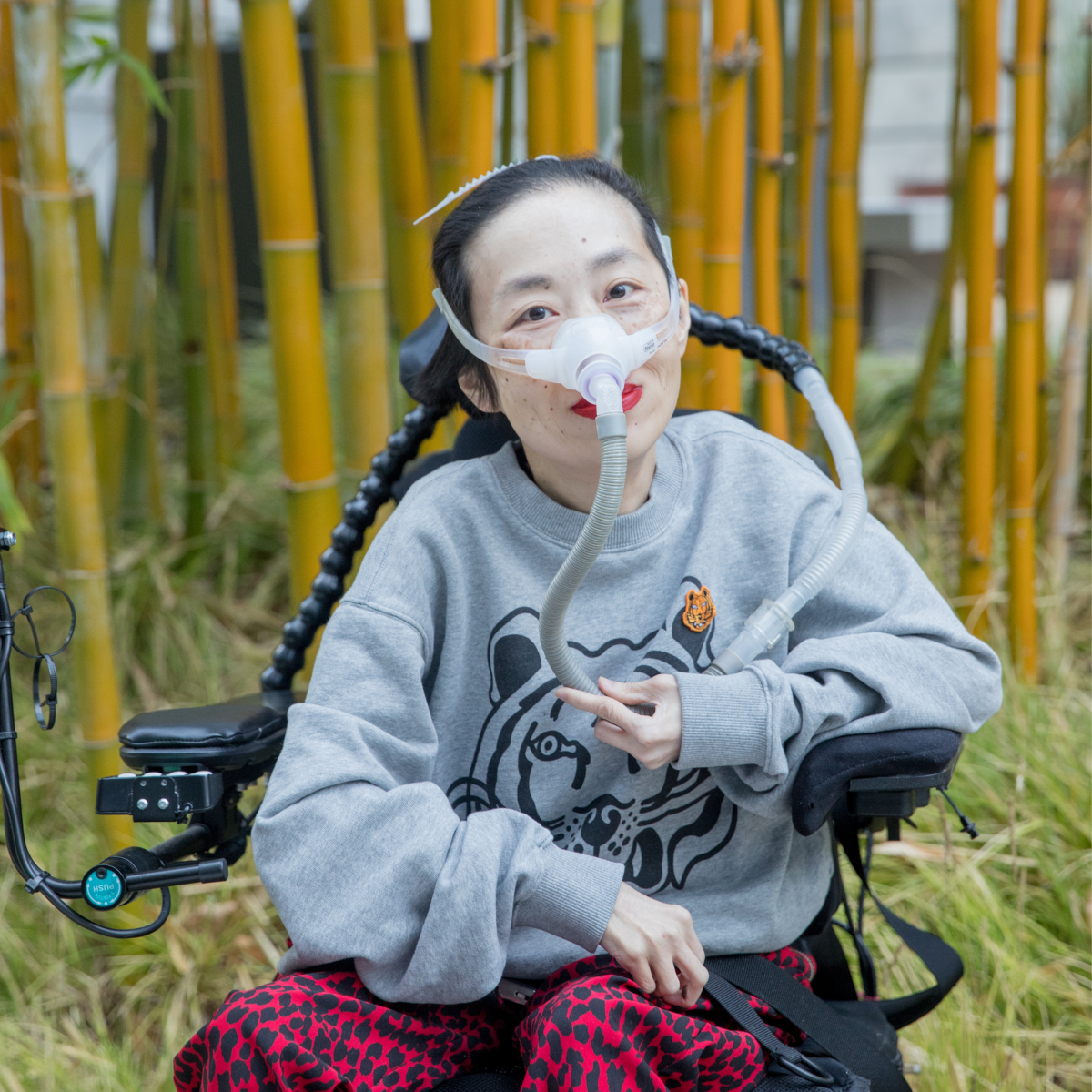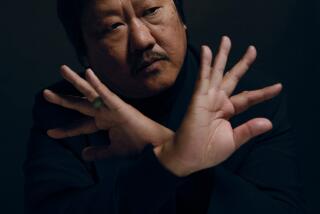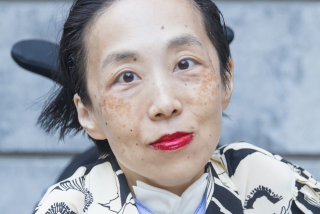For ‘disabled oracle’ Alice Wong, rest is a radical act

- Share via
Alice Wong is resting.
It’s an unusual pose for an author on the eve of a literary debut. It’s also an unaccustomed posture for the 48-year-old disability rights activist and self-styled “cyborg oracle,” whose work has earned her the ear of American presidents and the trust of tens of thousands of strangers.
With her trademark red lipstick, black power chair and gray ventilator, the petite public figure has spent the last decade shaping policy from the cramped bedroom of her San Francisco apartment.
When the city moved to ban plastic straws in 2019, she faced death threats for insisting that many disabled people need them. Her hashtag #CriptheVote ensured every Democrat on the ballot on Super Tuesday knew her name. And her pressure campaign in 2021 helped prioritize access to COVID vaccines for thousands of high-risk Californians.
Even now, in repose, she tweets constantly, though her muscles ache with the effort.
But Wong will not read from her hotly anticipated first memoir, “Year of the Tiger: An Activist’s Life,” at its launch party Wednesday night.
She will not give interviews or sign copies for fans.
When her book hits shelves Tuesday, the indomitable Alice Wong will be in bed.
“Disabled life, with its unpredictable crises, can upend and throw the best-laid writing plans into a dumpster fire,” the oracle foretold in “Year of the Tiger.”
Little did she know how prescient that line would be — and not just about writing.
Predictably, she had a Plan B.
::
“Alice has a plan for everything,” said Sandy Ho, Wong’s longtime friend and collaborator. “She describes herself as a disabled oracle, and that’s a part of it. She foresees the future.”
Increasingly, she also defines it.
The eldest daughter of immigrants from Hong Kong, Wong grew up in Indiana and has lived in San Francisco for most of her adult life. She rose to national prominence in 2013, when President Obama appointed her to the National Council on Disability.
In the years since, she’s conducted symphonies of online protest and swayed Democratic standard-bearers toward disability justice. She’s written a memoir, edited two anthologies, hosted a podcast and run the Disability Visibility Project, a platform for disabled writers and artists.
“One of the things that really gives me joy is the fact that there are so many amazing, brilliant, creative disabled people out there,” she explained in a breathy, slightly nasal voice, describing her first anthology to comedian W. Kamau Bell on the City Arts & Lectures podcast in October 2020. “But part of my rage — and it’s a very real rage — is that most people don’t really know about them.”
Wong was also the first person to visit the White House in cyborg form, attending the Americans with Disabilities Act 25th anniversary reception as a “telepresence robot” — like an iPad mounted on top of a Segway, with the spatial awareness of a Roomba — in 2015.

She collects stickers, binges “Star Trek” — “Deep Space Nine” is her favorite — and trades texts with a vast circle of friends.
“Alice was always the second person after my husband to figure out I was pregnant,” said Rebecca Cokley, U.S. disability rights program officer with the Ford Foundation. “I had pregnancy insomnia, and Alice is a night owl. I would lay in bed unable to sleep just talking to Alice.”
For her birthday this year, Cokley bought Wong a Cameo video message from actor John de Lancie, who played the omnipotent intergalactic trickster Q on “Star Trek: The Next Generation” and “Deep Space Nine.”
“He talked about how he looked up her book and he was really excited for it,” Cokley said. “I’m still hoping John de Lancie is going to tweet about ‘Year of the Tiger.’”
Like other disabled activists, Wong draws moral weight from her own identity and experience. Despite her success, she must adhere to strict asset limits or she will lose Medicaid coverage. Her influence does not shield her from jeering and stares.
Wong herself is unflinching about her condition and the apparatus that attend her. She was born with a form of muscular atrophy, a rare neuromuscular disorder that limits her movements and strength. She began using a wheelchair in grade school, and had come to rely on a BiPap ventilator worn over her nose.
“My cyborg body is tethered to orbiting satellites of objects,” Wong writes in “Year of the Tiger.” “These bits of hardware, machines, and everyday objects may not live and breathe, but they are a part of me. They simultaneously ground and liberate me. They center me and allow me to make the most of my life.”
The line comes from a previously published essay called “Ode to a Spit Cup,” a squirmy love letter to the clear plastic container she’d spit saliva and bits of food into to avoid breathing them into her lungs. The object is pictured in closeup, with alternative text in the captions.
Nevertheless, she was ambivalent about penning a memoir.
“It unsettles me to be in this category,” Wong writes in her book. “I will not excavate my innermost secrets and traumas for your consumption.”
Memoirs of abuse and exclusion are stock in trade for disabled writers. So too are tales of impairments “overcome” by pluck and courage. Wong was suspicious of the genre. But the pandemic made her reconsider.
Her editor Anna Kaufman at Vintage Books called the resulting memoir a “mosaic” — a remix of essays, interviews and archival ephemera relayed in a style that is by turns intimate, profane and crackling with righteous anger.
“What do we leave behind when we are gone? Since I’m not yet dead, I have no idea,” she writes in “Ancestors and Legacies,” an essay about the death of her friend Stacey Park Milbern, and her distress at how Milbern was misremembered.
“My disdain for the white disabled people who so badly wanted to be ‘allies’ with disabled people of color, who never understood Stacey’s politics or disability justice and never supported her work while she was alive, ignited a flame in me,” the essay continues.
“One day I will have ice cream with Stacey and talk s— about people again. I can’t wait.”
Her motto is f— the f—ers.
“Her willingness to speak truth to power, her ability to cut through the noise and remind people of what’s really important — I have no problem calling her the empress of the internet,” Cokley said.
So when Wong’s Twitter feed went dark for several days in mid-June, the disability community feared the worst.
::
Alive. Alice is alive, Wong’s sister Grace tweeted from her account on June 16. And scared. And mad. And loved. Changes are happening.
It was barely a week after Wong had closed major edits on “Year of the Tiger,” and less than three months from her publication date.
The author had planned to launch her book in a series of salons with other disabled Asian American writers, each reading from their own recent work. She was also busy promoting an upcoming panel of queer disabled writers of color.
Yet for days, her account had been silent.
Now, suddenly, there was panic.
“When her sister posted about her being sick, my phone blew up immediately,” Cokley said. “The response was ‘oh crap’ because we know how we are treated in the hospital.”
Loss is a constant among disabled activists. Even before the pandemic, many who went into the hospital never returned.
“It was devastating,” said Vilissa Thompson, a friend and fellow activist based in South Carolina. “The fear of losing Alice was really strong.”
Wong’s left lung had collapsed, she later explained in an essay. A cascade of crises and bureaucratic red tape kept her trapped for weeks in the ICU. She emerged with a tracheostomy and a feeding tube, interventions Wong described as both “the next iteration of [her] cyborg existence” and her “greatest fears.”
Her spare, airy voice was extinguished.
She could no longer eat, the jook and bone marrow she’d written so passionately about in her memoir replaced by a pricey tube-fed prescription called Liquid Hope.
“We were so scared,” said Jen White-Johnson, a disabled artist and activist, who collaborated with Wong on the Society of Disabled Oracles, an interactive mixed-media project launched this month. “Her collapsed lung was happening right as this book launch was coming. It’s almost as though the universe was working against her.”
Of course, Wong had a plan for that. The salons she’d envisioned could go on without her. Her friends could read her work in her absence, just as they managed her ongoing projects and spoke in her stead on social media and to the press.
But the round-the-clock care she would need to recover was beyond what her sisters or her parents could manage.
What she could not have planned for — what reduced her to tears of despair — was the $600 a day it would cost to stay out of a nursing home.
::
It is a fact universally acknowledged that one-third of GoFundMe campaigns are for medical bills. Less acknowledged, but equally true, is the fact that most fail to raise the desired donations, studies show.
So when Wong’s GoFundMe campaign for home care raised more than $150,000 in its first hours, even her most ardent supporters were stunned.
“A low six-figure fundraising goal is usually a fairly heavy lift, particularly in the disability community,” where most donors are also disabled and many live on fixed incomes, said friend Matthew Cortland. “So many people love Alice and respect her work and have benefited from it, in many ways she’s already done most of the work.”
Big donations poured in from celebrity admirers such as Roxane Gay, Selma Blair and Nick Cho, aka Your Korean Dad on TikTok. But thousands of others, many anonymous, continued to donate toward her goal.
“The outpouring of love and support for Alice is beautiful,” said Thompson, the South Carolina activist. “We talk about giving someone their flowers while they’re alive, and I think it’s really important in this moment for Alice to see how much everybody loves her and supports her.”
The money will mainly go to pay medical caregivers, who must attend to Wong 24 hours a day. Her family also paid out of pocket for a specialized lift and hospital bed that were not covered by Medi-Cal.
Even the oracle was “blown away” by the response, her friend Yomi Wrong wrote.
“Every. Single. Flower. Alice has ever planted is being returned to her,” Wrong wrote on Aug. 11, just three days after the campaign went live.
But almost as soon as Wong started tweeting again, followers started making demands of her.
“Expecting her to work-work-work — it reminds me that this community has not held space for disabled women of color,” Thompson said. “It just shows a lack of empathy and common sense.”
Ironically, those same followers often proudly claim “crip time,” an academic term whose common use means either “flexible” or “late.”
Many also call themselves “spoonies,” a popular online shorthand for people with limited capacity for tasks of daily life.
Sustaining the body is a tenet of disability justice. Rest is a radical act. Without it, activists say, the movement falls apart.
Another day, a different year, the oracle might school her acolytes.
But right now, Alice Wong is taking a rest.
More to Read
Sign up for Essential California
The most important California stories and recommendations in your inbox every morning.
You may occasionally receive promotional content from the Los Angeles Times.









